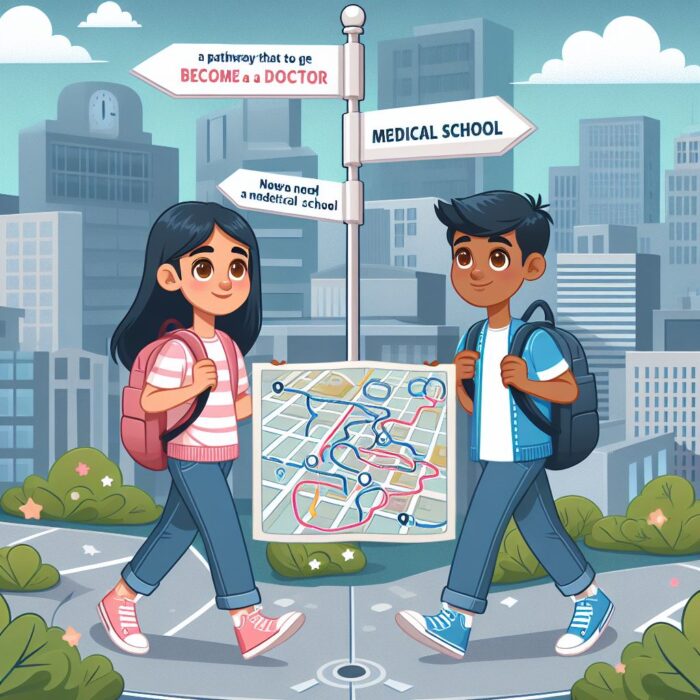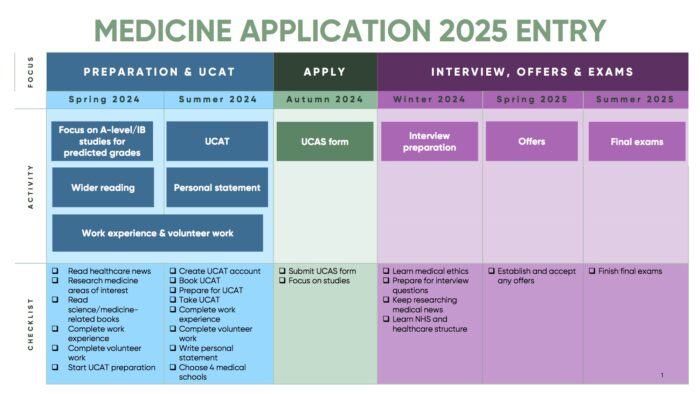
The pathway to studying medicine at a UK medical school requires dedication, passion and careful planning. It’s essential to understand the application process thoroughly to put yourself in the best possible position to get an offer, and here’s a step-by-step guide to help you navigate that pathway.
The journey begins with the University Clinical Aptitude Test (UCAT). The UCAT assesses various mental abilities and is a crucial component of the selection process for medical schools. It’s a pretty intense two-hour, computer-based test comprising multiple-choice questions. You book and sit the test in the same year that you apply through UCAS at your nearest Pearson VUE test centre, and it can only be attempted once per year. The five subtests assess verbal reasoning, decision making, quantitative reasoning, abstract reasoning and situational judgement. There are past papers online, as well as question banks and plenty of other free resources. Practice is essential to perform well on this test in order to be invited for interview, and every second counts in an assessment like this. You can see cutoffs of previous years here.
Undertaking relevant work experience and volunteer work in medical or caring settings is fundamental for your application. This experience not only demonstrates your commitment to the field but also provides valuable insights into the healthcare profession. Make sure you have this in your summer 2024 plans, or even before! Also, it’s time to get reading! Familiarising yourself with current affairs, hot topics in the NHS and a recent medical research advancement is important for you to gather information for your upcoming interviews and personal statement. This can be a book, a magazine, or a TED talk!

Completing your UCAS form involves selecting four chosen medical schools and a backup option in another subject. Your personal statement, a key component of the UCAS application, should articulate your passion for studying medicine and highlight your relevant experiences and skills.
Choosing the right medical schools requires careful consideration of various factors, including location, course structure, teaching and learning methods, and available facilities. You will need to choose your medical schools strategically based on your UCAT score. You can apply for a maximum of four medical schools, with an option to use your fifth university to apply for a backup course. Check out this medical school comparison tool. It’s a good idea to visit the university open days, and you might want to consider things such as the teaching method (traditional/problem-based learning), how early on you get clinical contact, the length of the course and whether you have the opportunity to take an intercalated bachelor’s degree (BSc).
Your personal statement serves as an opportunity to showcase your motivation, exploration of the medical field, and suitability for a career in medicine. There is plenty of advice online about how to write it, and being up to 4,000 characters long it can use the following framework:
· Motivation – why do you want to be a doctor? What do you understand about the role of a doctor and the NHS?
· Exploration – what have you done to learn about a career in medicine? What have you learnt from your hands-on work experience and volunteer placements? What wider reading and study have you explored in science and medicine?
· Suitability – why are you a great fit? What are your extracurricular activities for a work-life balance? What evidence do you have of working successfully in teams and in communication skills?
· Conclusion – coming back to your motivation
If your UCAT score meets the cutoff criteria, you may be invited to interviews. These interviews may be panel-based or in the form of multiple mini interviews (MMIs). Preparation is key, as you’ll be expected to discuss various topics, including your motivation for studying medicine, teamwork abilities, understanding of medical ethics, and knowledge of current healthcare issues. Brush up on your personal statement and of the course structure of the university that is interviewing you.
Medicine application 2025 timeline
· 14 May: create a UCAT account
· 18 June: booking opens for the UCAT test
· During June, July, and August: Undertake work experience and volunteer work, carry out extra reading and research, and prepare your personal statement and UCAS form
· 16 October: UCAS medicine deadline
· Between December and March: interview invitations and offers are extended
· By March: successful applicants receive offers

Start reading medicine news, start thinking about your WHY. Familiarise yourself with an area of medical research that you are interested in, and keep abreast of healthcare news – look at what is happening in the media around the NHS. But most importantly, focus on your current studies to meet those high entry requirements. Check out the tutors on our books with UCAT expertise, advice and specialised UCAT tuition and interview prep, and don’t hesitate to get in contact if you have any questions.